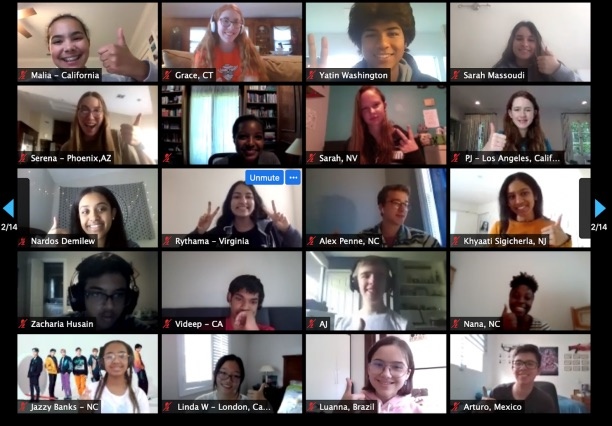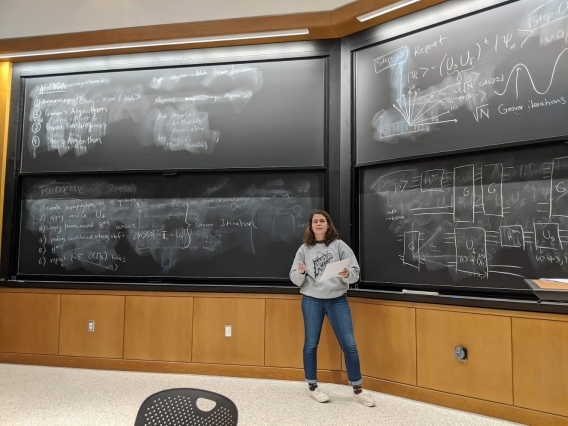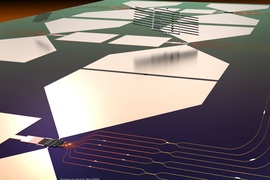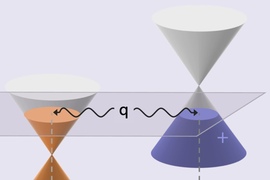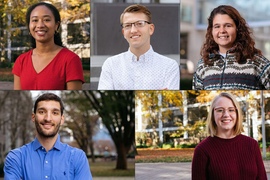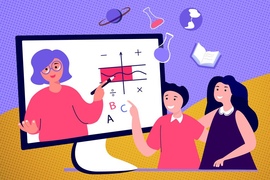Quantum computing has the potential to change the world as we know it, yet limited K-12 educational resources on quantum computing exist. MIT researchers have partnered with The Coding School (TCS), a tech education nonprofit, to address this gap. This first-of-its-kind initiative, playfully named “Qubit by Qubit,” aims to introduce high school students to quantum computing through two programs: a week-long summer camp and a year-long course, led respectively by Amir Karamlou and Francisca Vasconcelos of the MIT Research Laboratory of Electronics (RLE)’s Engineering Quantum Systems (EQuS) research group.
An all-online format with live instruction by MIT researchers, the program is open to high school students around the United States and worldwide. The goal of these programs is two-fold: first, to excite students about quantum computing and provide them with real-world quantum skills; and second, to increase diversity in the field of quantum computing by focusing on outreach to underrepresented groups in STEM, including women, students of color, and those from low socioeconomic backgrounds. To achieve these ends, they have partnered with MIT’s Center for Quantum Engineering, which supports the development of a U.S. quantum workforce through a range of fellowship programs, educational curriculum development, and quantum-related research activities at MIT. The educational initiative is also sponsored by Google AI and IBM Quantum.
MIT alumnus Amir Karamlou '18, MEng '18, who recently led the week-long summer camp, is currently a second-year graduate research fellow with EQuS at MIT. His research focuses on experimental quantum computation using superconducting qubits to simulate many-body quantum systems, and he has been teaching the undergraduate-level Introduction to Quantum Computing course during MIT’s Independent Activities Period (IAP) since 2017.
“The most exciting part of teaching this camp is that we get to introduce quantum mechanics and quantum computing to many students for the first time!," Karamlou says. "And through this process, we also get to reach out to groups that are normally underrepresented in our field, and get students interested in pursuing quantum computing in college and grad school. I vividly remember the excitement of learning about quantum computation from my freshman advisor, and would like to distill the same enthusiasm in the next generation of scientists and engineers. The technology has advanced considerably since my freshman year at MIT; learners now have access to real quantum processors through the cloud and can learn by running small-scale quantum programs in real-time.”
The camp had approximately 300 participants from 18 countries and 30 states, 70 percent of whom are from underrepresented backgrounds. Advanced topics in quantum computing were met with enthusiasm and excitement, and an overall interest to learn more. During the week, the students coded and executed over 1,000 quantum circuits on actual quantum hardware available through IBM Quantum’s cloud platform.
“Teaching this camp challenged me to think about many of the concepts that I use on a daily basis from a whole new perspective, which helped me a lot as well,” says Karamlou. “I found the experience to be very rewarding, especially after reading feedback that we got from the students at the end of the program. An overwhelming majority of the students indicated that attending this camp increased their interest in quantum computing, and that they want to learn more about quantum computing in the future. The program received many amazing testimonials, which means a lot to me personally.”
Student testimonials from the Qubit by Qubit camp
- “As a Latin American student, I don’t have a lot of opportunities to learn topics like quantum computing or quantum mechanics. This experience was awesome, I enjoyed everything, of course it was challenging at first, but I learned a lot and It made me realize that maybe this is what I want to do for the rest of my life.”
- “I enjoyed the Quantum Computing camp greatly. I have felt a lot of times in my life like I wasn't good enough at STEM to pursue it in the future and this camp helped me to realize this is false. Being taught by MIT researchers who are genuinely passionate about the quantum computing allowed me to also get super excited about technology, coding, and the future. It has motivated me to continue to pursue this field, and computer science in general, on my own and perhaps in my final year of high school and moving into college.”
- “I really enjoyed being able to learn about quantum in an environment where I felt comfortable asking questions and interacting with teachers. The course material was challenging, but not so challenging that it was impossible to understand, and after reviewing it, things began to make sense. This was in no small part a result to the amazing teachers, who were incredibly patient and clear in explaining and re-explaining things in a simple, understandable way. The camp got me much more interested in quantum, and I hope to study it more intensively in the future.”
Leading the curriculum development for a year-long “Intro to Quantum Computing” course
Francisca Vasconcelos graduated from MIT this year, with a bachelor's degree in electrical engineering and computer science and in physics, and will be studying statistical science at Oxford University this fall as a Rhodes scholar. During her two years as an Undergraduate Research Opportunities Program student in the EQuS group, as well as through internships at Rigetti Computing and Microsoft Research Quantum, Vasconcelos worked on a number of research problems related to benchmarking, readout, and noise mitigation of superconducting qubits. In her future research, she is interested in studying the intersection of machine learning and quantum computing.
Vasconcelos was first introduced to quantum computation and information in her first year, when she took Karamlou’s IAP course. Sophomore year, she began volunteering for The Coding School, improving the “Intro to Python” curriculum. In 2019, she joined the IAP quantum course staff, which was her first classroom teaching experience. The experience gave her the confidence and enthusiasm to pitch the idea of a quantum computing curriculum for high schoolers to Kiera Peltz, founder and leader of The Coding School. Vasconcelos has since been leading the development of the year-long “Intro to Quantum Computing” course for high schoolers, which will launch this fall.
“I am looking forward to introducing many students to quantum computing for the first time, through the year-long course," she says. "I still remember when I first heard about a quantum computer in high school, via a YouTube video, and was absolutely amazed. I hope to spark similar excitement and enthusiasm in the kids taking our course, while giving them the opportunity to delve further. That being said, it is challenging to make broadly accessible such interdisciplinary content, which most students would otherwise only see late in undergraduate or even graduate school. I am thankful that a committed team of undergraduate and graduate students from MIT, Yale, Harvard, and EPFL have joined me in this effort and continue to find new ways to make the material approachable, yet exciting.”
The Coding School nonprofit is committed to empowering minorities in STEM (students of color, women, students with disabilities, and students from lower socioeconomic status). The organization has led numerous initiatives to provide scholarships to these groups that enable participation.
Building the quantum workforce from the ground up
Professor William D. Oliver, who leads the EQuS group and serves as director of the Center for Quantum Engineering (CQE) in the RLE, strongly supports the development of a diverse quantum workforce.
“One critical aspect of the CQE mission is educating a quantum workforce," he says. "This includes, of course, undergraduate and graduate students at MIT. But, there is also substantial work that we can and should do beyond the Institute. For example, the CQE in conjunction with MIT xPRO has developed a series of professional development courses aimed at midcareer professionals who want to pivot to quantum technologies.”
Oliver continues, “In addition to reaching to more senior learners, we also have the opportunity to reach junior learners, including high school students. Instilling the highly nonintuitive concepts of quantum mechanics in young people will help motivate and prepare them for quantum-related education at university. And, it’s not hard to find interested students! Quantum is 'cool,' and there is broad interest in the strange world of quantum mechanics and how it works. Capturing and building on this enthusiasm is why that CQE wholeheartedly supported the EQuS students and The Coding School. It’s a great way to reach students who are eager to learn about quantum technologies.”
